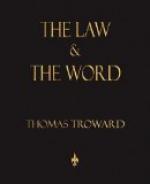It matters, then, very little what particular words we use. What does matter is the intention and faith with which we use them. But perhaps some reader will here take the role of cross-examining counsel, and say: “You have just said it is a case of synchronous vibration—then surely it is the actual sound of the particular syllables that counts—how do you square this with your present statement?” The answer is that the Law is always the same, but the mode of response to the Law is always according to the nature of the medium in which it is operating. On the plane of physical matter the vibrations are in tune with physical sounds, as in the experiments with the eidophone; and similarly, on the plane of ideas or “noumena,” the response is in terms of that plane. The word which creates “noumena,” or spiritual centres of action, must itself belong to the world of “noumena,” so that it is not illogical to say that it is the intention and faith that counts, and not the external sound. In this is the secret of the Power of Thought. It is the reproduction, on the miniature scale of the individual, of the same mode of Power that makes the worlds. It is that Power of Personality, which, combined with the action of the Law, brings out results which the Law alone could never do—as the old maxim has it, “Nature unaided fails.”
This brings us to another important question—is not the creative power of the Word limited by the immutability of the Law? If the Law cannot be altered in the least particular, how can the Word be free to do what it likes? The answer to this is contained in another maxim: “Every creation carries its own mathematics along with it.” You cannot create anything without at the same time creating its relation to everything else, just as in painting a landscape, the contour you give to the trees will determine that of the sky. Therefore, whenever you create anything, you thereby start a train of causation, which will work out in strict accordance with the sort of thought that started it.




